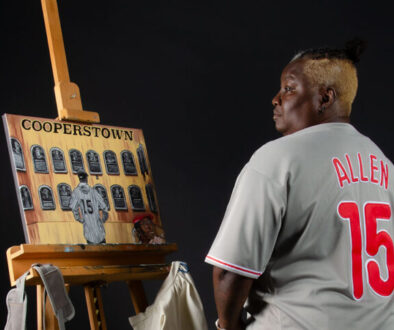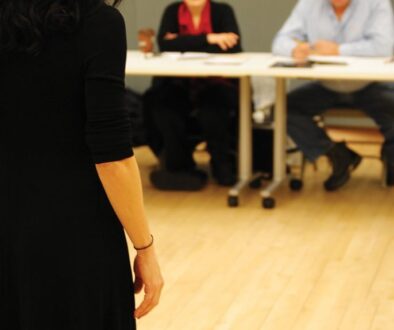Victor Grasso Lightens Up
Running into Victor Grasso at the grocery store is disconcerting. Remember when you were a little kid and you’d see your teacher someplace out in the world? That’s kind of what it feels like. You think of them as belonging in one place, as one thing, and seeing him or her anywhere else feels…weird. Since I am both a longtime acquaintance and a fan of Victor’s work, it’s difficult for me to make the shift from “Holy cow” when viewing his work at a gallery or watching a drawing progress on Instagram, to bumping into him at the Acme, or along the Delaware Bay near the North Cape May home he shares with his wife, Alicia, and two children.
I sat down with Victor late last year, fresh off his triumphant “The Sea Is Calling” show at SOMA Gallery in Cape May, featuring works by the man and his muse of the past couple of years, Bela Lotozo.
Let’s talk about the connection between artist and muse. What links you to them? You have to make a personal, emotional link with them, for sure. First, it’s about the look. But before you attempt to do anything, you have to make sure your muse can convey what you’re trying to say, because it’s not just about painting a pretty picture. I mean, there are some beautiful, beautiful women out there, who simply…can’t model. They look nice, but they’re like a deer in headlights. They can’t convey any message at all. People think of models, they might think oh, vacant—Diet Coke and cigarettes. But a model—a good one, like Bela—can capture a moment. I can just give her a sketch or tell her a story and she can just convey what I want. She gets it. She’s great at it. It’s like the connection between a director and an actor. I’m able to tell a story through her.
Do you think if that connection’s missing, it shows up in the painting? I’m speaking about other artists’ work here, of course. Well, not necessarily. There are people who are so good, they can just have someone standing in front of them and paint them, and they’re good enough that it stands on its own. They’re not trying to tell a story. I’m trying to tell a story. I’m trying to say something.
Do you take offense when people look at your work and think it’s a photograph? Well, it’s kind of irrelevant, frankly—it’s a reaction from an untrained eye. It’s not their fault—they just don’t know art very thoroughly.
So, as a serious artist, that offense isn’t keeping you awake at night. There’s very little that offends me.
Really? No, not really. Actually, everything offends me, generally.
So you consider yourself a sensitive person? Yeah. Definitely. [l-o-n-g pause] Or…a misanthrope. One or the other.
Creativity is kind of a 24/7 occupation, difficult to corral and relegate. Do you have a set routine? Well, yes—because my schedule is dictated by the kids’ schedules to a degree. But when Alicia is home and I can get to work, I can and do sometimes go all night long.
Do you work for commission at all? Not anymore.
Which brings me to the next and obvious question: would you do it again? I’d rather not, but I’d never say never. If you have a year where you don’t sell anything and you need the money, then you do it. I mean, I’m not going to go out and get a regular job.
If you had to go out and get a regular job tomorrow, what kind of job would you get? I have no idea—I haven’t had a regular job since I was 18 years old.
Is there something innately offensive about working on commission for a serious artist? It’s not offensive in and of itself —it’s simply that it’s someone else’s vision. But it can have offensive elements. If someone’s asking you to paint something and your background color doesn’t match her curtains and that becomes an issue, well—that’s a hassle.
More trouble than it’s worth? Yes. Because you’re doing it for a paycheck.
And that’s not why you’re doing this. No. Not at all.
Why are you doing this? I don’t know. Why do you write?
Because I feel compelled. Well, I don’t feel compelled, at least I don’t think so. This might sound stupid, but I don’t know how else to say it: it does me, I don’t do it.
I understand. It sounds like being compelled… Yes, but…I do it for me. I’m not painting with “I hope this sells” in the back of my mind. I paint because it’s something I want to create. And usually, ironically, those are the ones that sell right away. I think people can see that—it’s different than when you’re just pumping stuff out for money. I mean, you can get away with that for a while, but eventually… otherwise, you’d see me painting beach scenes.
But you’re from here and you live and work here. Your work’s very… sea-oriented. Well, yes—but not in ways that you’ve probably seen before. It’s like a story, and how you might choose to write it. I mean, look at Rent. It’s basically La Boheme, it’s just told in a different way.
What do you do when you get stuck? When I get stuck?
Whatever the artist’s equivalent of writer’s block is. I don’t really get stuck, as in a lack of ideas. It’s more in the conveying—when I’m not happy with what’s showing up, when it’s not translating to the canvas. I don’t know whether it’s a self-confidence thing or self-doubt, but if I feel like it’s not clicking, that can just bog me down for days. It’s never a lack of ideas. There’s not enough time in the world for me to paint everything that’s in my head.
So it’s fully formed, up there in your head? Or is it a snippet and then you start and you’ll know it when you see it? No, it’s fully formed. It’s just a matter of matching it up, of applying the brush strokes the way they should be and really, just getting better at it. Raising my own standards. Because I’m not academically trained, I don’t have a system in place—it’s always like solving a puzzle for me. But on the other hand, there’s nobody who paints like me, because I’ve developed my own problem-solving techniques.
I took my kids to see “The Sea Is Calling.” Then I asked them what they would ask you. My son [age 9 at the time of this interview] wanted me to ask you if your work is hard for you. YES! (laughs)
He also wanted to know if it feels like work. No, no it doesn’t, ever, and I don’t even know how to explain that, the difference between how it’s hard, but that it doesn’t feel like work. When it clicks, you’re on autopilot and things are falling into place. And when it doesn’t, it hurts your head. I don’t know that I could let it feel like work. That could be a problem. Work, as a concept, isn’t fun. I work hard, and I think it’s good to work hard. It’s just not necessarily good to work. It probably wouldn’t be as hard if I weren’t always trying to get better, if I was just satisfied where I am.

Do you think you’ll ever get there? No. If I did, then I’d be done. And I’m not done.
My daughter wanted to know if you were friends with the lady you painted with an octopus on her head. When I said yes, she wanted to know why you would ask a friend to put an octopus on her head. Why not? I think putting an octopus on your head is kind of fun. I put a lot of images together that may not belong together. Putting a painting together is a lot like making a movie —you have the model and the makeup and the lighting and the costume and the props and the directing and the shooting. So yeah, the occasional odd request might be made. It’s not like I’m asking her to put leeches on her eyelids or anything.
Any interest in making a movie? I loved Frank Weiss’s documentary on you. Actually, making a feature film is on my bucket list.
You don’t strike me as the romantic comedy type. What kind of movie are you drawn to? It’s probably not a stretch for you to believe that I’m a big gore/horror fan. But that’s not the kind of movie I’d like to make. I’d much rather make something with more…humor, more gumption. Tarantino, Guillermo del Toro, in that vein. But likely without the couple of million to make it…I like the anti-hero, someone who has intentions for good, but is flawed. Classic movie example is you have John Wayne over here, super hero, good guy, Captain America type, and then over here you have James Dean or Marlon Brando. Those are the guys I identify with, because they clearly have an internal struggle. That’s how I feel about my work. People say it’s dark, and maybe the subject matter is, but to me, it’s just realistic. That’s real, that’s gritty. Every one of us has a dark side. It doesn’t mean we’re bad or evil.
Speaking of kids, how has your work been affected since you became a parent? It hasn’t.
Now that’s interesting to me, both as a fan of your work and as a parent. And I’m not sure I buy it. Oh, come on—it’s such a cliché! That you have this magical, life-changing epiphany type situation because you have kids…
I’m not saying it affects your work directly—more that it affects your worldview to some degree, yes? No. It affects your work in that you don’t have as many hours to do it, or it changes the hours during which you can do it, but beyond that…what people don’t understand is that being an artist means being alone. I’m alone when I’m working, all day, every day. Unless there’s a model sitting there – but even then, I’m not chit-chatting with them. I don’t want to say it means you’re self-centered, because that’s clichéd too. But it’s so introverted—it’s a very small world you’re living in. It’s its own thing. There’s life, and that’s over here, and then over there is the work. And the work is solitary, so nothing out there really affects the work.
I can understand that. Writing is also a pretty solitary business. Yes, but it’s a much, much lower art form.
I beg your pardon? Well, that’s what Dali said: painting is the highest art form.
Oh, you mean Salvador Dali. I thought maybe you meant Dolly Parton. Well, she may have said it, too. Actually, she’d probably say music. But she’d be wrong.
So you also believe that painting is the highest art form? I don’t know, actually. Sculpture is really up there, too.
Do you sculpt? No. Mostly because I don’t have the time. Plus, I don’t know how to sculpt. I do know how to paint. At least I tell people that I do.
Well, you’re getting away with it nicely. So far, so good.








